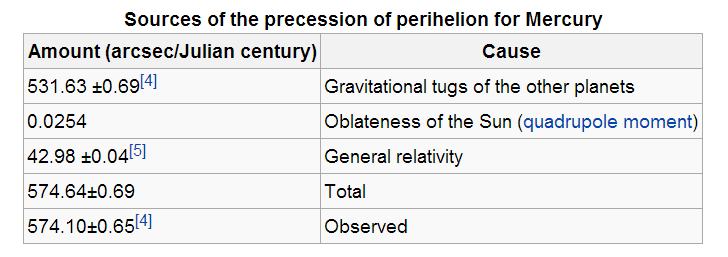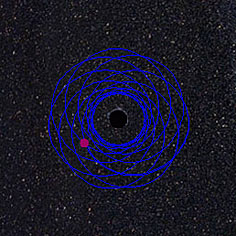Mercury has a weird orbit. It's elliptical orbit rotates around an axis, but for no readily apparent reason. My question is why? What is causing this?
-
$\begingroup$ There are two significant causes. The largest one is pretty mundane and was fully understood in the 19th century. The smaller effect is the one people usually talk about, and had to wait until the early 20th century for an explanation. Which are you interested in? $\endgroup$– dmckee --- ex-moderator kittenCommented Sep 15, 2013 at 16:25
-
$\begingroup$ If this is a reference to Mercury's orbital precession, the anomaly which cannot be explained via Newtonian mechanics matches well with the effect predicted by general relativity, making it empirical evidence in support of Einstein's theory. $\endgroup$– Anthony XCommented Sep 15, 2013 at 16:33
-
$\begingroup$ Both, the larger effect will be of more use, but the smaller effect would be interesting I'm sure (I'm assuming the smaller effect is Relativistic, like usual) $\endgroup$– Nicholas PipitoneCommented Sep 15, 2013 at 16:33
-
$\begingroup$ The larger effect is classical gravitational perturbations due to the other planets (I imagine that Jupiter dominates, it usually does). I think there is a derivation in Goldstein. $\endgroup$– dmckee --- ex-moderator kittenCommented Sep 15, 2013 at 16:40
2 Answers
The actual amount of the precession for Mercury is about 574 arcsec/century so your figure is ten times too big. This is mostly due to tugs from other planets. Oblateness of Sun has an effect but too small to measure. About 43 arcsec/century is an effect of general relativity.
This table from Wikipedia gives the figures.

-
$\begingroup$ What keeps it in it's stable orbit then? If I open a simulator and plop mercury in, it stays in a simple elliptical. If I put another planet in then Mercury flails wildly in some obscure ever-changing orbit before either crashing into the sun or flying out into space. $\endgroup$ Commented Sep 15, 2013 at 16:49
-
2$\begingroup$ Either your simulator is not very good or the orbit parameters you are putting in are not correct. Stability of orbits is an interesting question in general, but different from this one. You may want to ask it separately. $\endgroup$ Commented Sep 15, 2013 at 16:53
-
1$\begingroup$ @NicholasPipitone Either you are inserting extra planets which are too close and too heavy for stability or your integrator is buggy somehow (even if written correctly if may be an algorithm that does not handle n-body problems well). You would have to take that to SciComp.SE. $\endgroup$ Commented Sep 15, 2013 at 16:53
There are two reasons.
The first is due to the other planets. The other planets exert an average central inverse-square force ($\frac{\beta}{r^2}$) on Mercury. (If you average out the force over their full rotation). The standard keplerian elliptical orbit is of the form $r=\frac{p}{1+e\cos \theta}$.a With this term, the equation changes to$r=\frac{p'}{1+e'\cos\gamma\theta}, \gamma=\sqrt{\frac{m^2+\beta}{m^2}}\lesssim 1$. This is almost an ellipse, but the $\gamma$ means that the motion repeats after slightly less than a full revolution around the sun, causing precession.
The second reason is that General Relativity forbids perfectly elliptical orbits (one can have a circular orbit if one neglects dissipation, but not an elliptical one). Instead, we have Rosetta orbits

The image shown is a bit to the extreme end, for Mercury this rosetta has a much smaller precession.
Both effects contribute to the precession of Mercury.
-
$\begingroup$ Thank you for the equations, it has helped a lot. The simulator still isn't perfect though, it vibrates around an orbit before finally swapping orbits. Here is a picture: s1328.photobucket.com/user/Nicholas_Pipitone/media/… $\endgroup$ Commented Sep 15, 2013 at 17:20
-
$\begingroup$ @NicholasPipitone Have you adjusted the distances, masses, and speeds properly? $\endgroup$ Commented Sep 15, 2013 at 17:21
-
$\begingroup$ What integrator are you using? Have you tried a couple of different ones to rule that out as the cause of this effect? $\endgroup$ Commented Oct 2, 2013 at 13:20
-
$\begingroup$ @NicholasPipitone: have you tried reducing your timestep? $\endgroup$ Commented Oct 2, 2013 at 13:20
